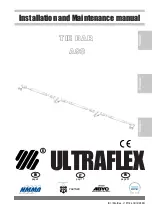
Relay TesTeR
Model no:
Ta131
Thank you for purchasing a sealey product. Manufactured to a high standard, this product will, if used according to these
instructions, and properly maintained, give you years of trouble free performance.
IMPORTANT:
PLEASE READ THESE INSTRUCTIONS CAREFULLY. NOTE THE SAFE OPERATIONAL REQUIREMENTS, WARNINGS & CAUTIONS. USE
THE PRODUCT CORRECTLY AND WITH CARE FOR THE PURPOSE FOR WHICH IT IS INTENDED. FAILURE TO DO SO MAY CAUSE DAMAGE AND/OR
PERSONAL INJURY AND WILL INVALIDATE THE WARRANTY. KEEP THESE INSTRUCTIONS SAFE FOR FUTURE USE.
1. safeTy
9
The warnings, cautions and instructions referred to in this manual cannot cover all possible conditions and situations that may occur. It
must be understood that common sense and caution are factors which cannot be built into this product, but must be applied by the
operator.
WaRNING! Use eXTReMe CaUTION
when working with high voltages.
IF IN ANY DOUBT CONSULT A QUALIFIED ELECTRICIAN.
WaRNING!
engines produce carbon monoxide which is odourless and causes slower reaction time which could lead to serious injury.
An engine which is operating should be in a well ventilated area, or the vehicle’s exhaust should be connected to an adequate fume
removal system.
8
DO NOT
use the relay tester if it has been damaged.
8
DO NOT
use the relay tester when hands are wet.
9
Familiarise yourself with the fuses and relays layout, normally shown on the fuse and relay housing cover or the vehicle manual.
9
Switch off ignition and remove ignition key when removing and replacing fuses.
9
Always renew a fuse with the identical fuse and rating, never use one with a different rating or substitute anything else.
9
Switch off ignition and remove ignition key when removing and replacing relays.
9
Always renew a relay with an identical relay, never use one that is similar, which may perform different functions.
9
Familiarise yourself with the application and limitations of the relay tester.
9
When working on a vehicle which is being tested or repaired ensure that the handbrake is on and the front wheels are chocked to avoid
the vehicle moving and causing injury.
9
Wear suitable eye protection when testing or repairing a vehicle.
9
Select the relay to be tested and follow the instructions before commencing testing.
9
Always take care when working with voltages above 35V dC. These voltages are considered a shock hazard.
9
If any abnormal results occur, the relay tester must be checked out by an authorised technician.
9
When not in use, store the relay tester carefully in a safe, dry, childproof location out of direct sunlight. Storage temperature range:
-15°C to +50°C.
2. INTRODUCTION
Health test for 4 and 5 pin electro-mechanical relays commonly found on modern vehicles. Test feature will cycle the relay ten times, testing the
resistance, contacts and consistency within each cycle. If a cycle fails on the test then this will be indicated by a red led and alternatively a
green led if the relay works. Supplied in zipped pouch.
TA131 Issue 2 (HF) 09/05/18
Original Language Version
© Jack Sealey limited
Refer to
instructions
electrical shock
hazard
Wear eye
protection




















